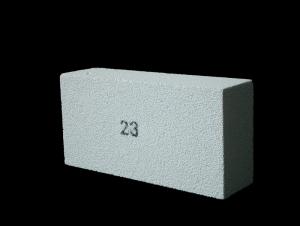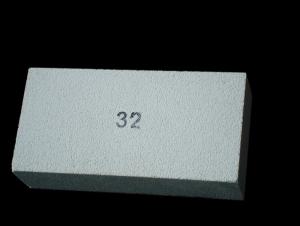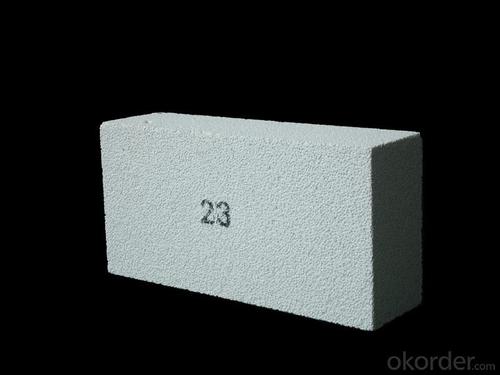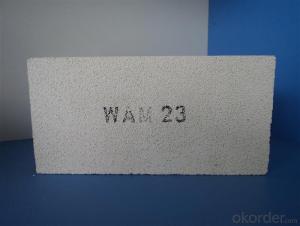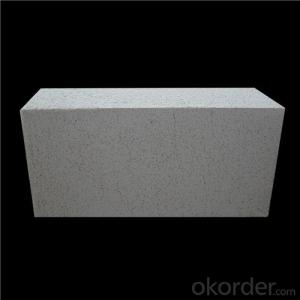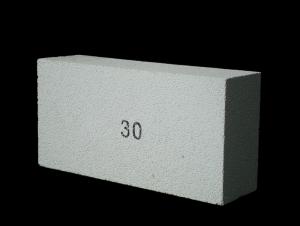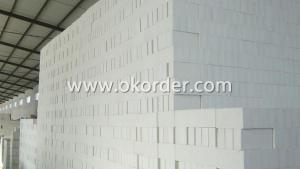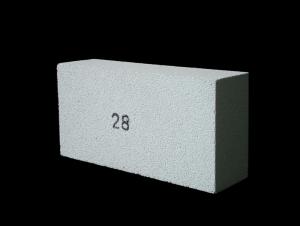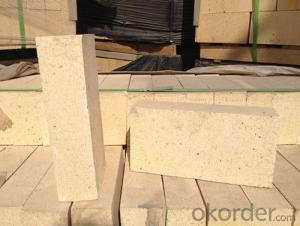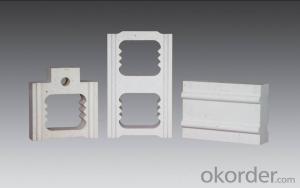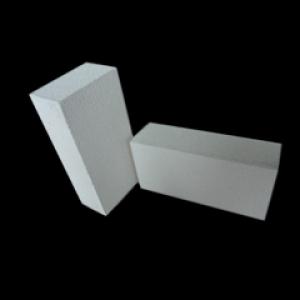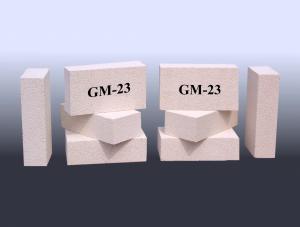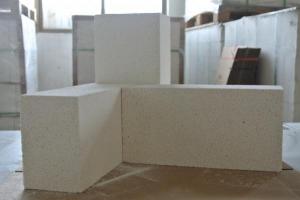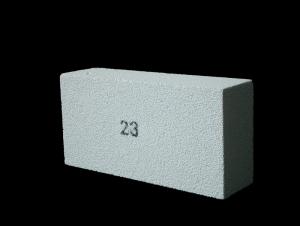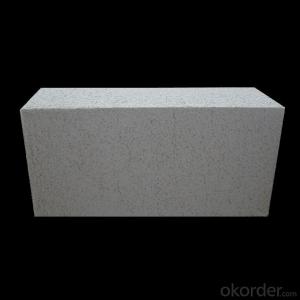Insulating Fire Brick - MS32
- Loading Port:
- China Main Port
- Payment Terms:
- TT or L/C
- Min Order Qty:
- 1000 pcs pc
- Supply Capability:
- 1000 Tons Per Month pc/month
OKorder Service Pledge
OKorder Financial Service
You Might Also Like
General Information of Insulating Fire Bricks MS32
Insulating fire brick MS32 temperature is 1760℃(3200℉). We could supply a wide range of shapes. For insulating fire bricks MS32,we choose the extruding method. Extruding insulating fire bricks have better strength and offering great performance in load bearing applications and in conditions where abrasion from mechanical abuse or flow of hot gases.
Feature of Insulating Fire Bricks MS32
Light weight and low thermal conductivity
Low heat storage
Low iron and impurities
High thermal shock resistance
Application of Insulating Fire Bricks MS32
The insulating firebricks can be used as a hot face lining directly exposed to the heat or as a backup insulation layer in iron and steel mills, non-ferrous foundries, petrochemical, ceramic, glass.
Data Sheet of Insulating Fire Bricks MS32
|
| GJM32 |
Physical Properties: |
|
|
Classifiction Temperature | ℃ | 1650 |
Density | Kg/m3 | 1100 |
Cold Crushing Strength | Mpa | 3.5 |
Reheating Linear Change(24hrs) |
|
|
1650℃ | % | 0.8 |
Hot Load Strength Deform(90 minutes) |
|
|
1370℃ at 0.069 Mpa(10psi) | % | 0.1 |
Thermal Conductivity |
|
|
400℃ | W/m.k | 0.32 |
600℃ | W/m.k | 0.35 |
800℃ | W/m.k | 0.38 |
1000℃ | W/m.k | 0.42 |
1200℃ | W/m.k | 0.44 |
Specific Heat | KJ/Kg.K | 1.10 |
Chemical Analysis: |
|
|
Al2O3 | % | 75.0 |
SiO2 | % | 23.2 |
Fe2O3 | % | 0.5 |
TiO2 | % | 0.1 |
CaO | % | 0.1 |
MgO | % | 0.1 |
Na2O+K2O | % | 0.6 |
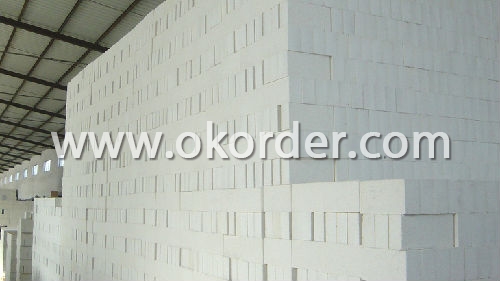
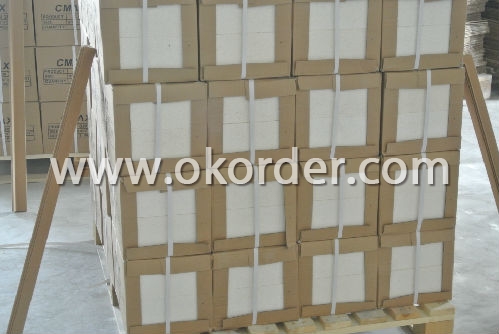
- Q: Do insulating fire bricks have a high fireproof rating?
- Insulating fire bricks indeed have a high fireproof rating. These bricks are specifically designed to withstand extremely high temperatures and provide excellent insulation against heat transfer. They are made from special refractory materials that have low thermal conductivity, which helps in retaining heat and preventing it from escaping the system. Insulating fire bricks can withstand temperatures ranging from 2300°F to 3100°F (1260°C to 1700°C), making them ideal for use in furnaces, kilns, fireplaces, and other high-temperature applications. Their high fireproof rating ensures that they can effectively protect structures and equipment from the intense heat and flames, allowing for safe and efficient operation in various industries.
- Q: Can insulating fire bricks be used in residential applications, such as fireplaces or ovens?
- Residential applications like fireplaces or ovens can indeed utilize insulating fire bricks. These bricks are specifically designed for enduring high temperatures and providing outstanding thermal insulation. They are crafted from lightweight materials like clay or alumina, which possess low thermal conductivity. This attribute assists in retaining the heat within the fireplace or oven, enhancing efficiency and reducing energy consumption. Moreover, insulating fire bricks exhibit exceptional resilience against thermal shock, enabling them to withstand sudden temperature fluctuations without cracking or breaking. Additionally, these bricks are non-combustible, ensuring they can withstand the intense temperatures produced in fireplaces or ovens without posing a fire hazard. Consequently, insulating fire bricks are a suitable option for residential applications requiring high temperatures and thermal insulation.
- Q: Can insulating fire bricks be used for insulation in smelters?
- Yes, insulating fire bricks can be used for insulation in smelters. Insulating fire bricks are designed to withstand high temperatures and provide excellent insulation properties, making them suitable for use in smelting operations where heat containment is crucial to optimize energy efficiency and protect the surrounding environment.
- Q: What is the typical lifespan of an insulating fire brick?
- The typical lifespan of an insulating fire brick can vary depending on several factors. These factors include the type and quality of the brick, the temperature and conditions it is exposed to, and the level of maintenance it receives. In general, insulating fire bricks are designed to withstand high temperatures and provide insulation in various industrial applications such as kilns, furnaces, and fireplaces. They are made from lightweight refractory materials that have good thermal insulation properties. With proper installation and regular maintenance, insulating fire bricks can last for many years. However, over time, exposure to extreme temperatures, thermal cycling, chemical corrosion, and mechanical stress can cause gradual wear and tear, leading to a decrease in their lifespan. On average, insulating fire bricks can typically last anywhere from 5 to 20 years. This range is quite broad due to the aforementioned factors. Bricks used in higher temperature applications or subjected to more severe conditions may have a shorter lifespan, while those in less demanding environments may last longer. To maximize the lifespan of insulating fire bricks, it is important to follow proper installation techniques, use bricks with the appropriate temperature rating for the application, and regularly inspect and maintain the bricks. This includes checking for cracks, erosion, or any signs of deterioration and promptly addressing any issues to prevent further damage. Overall, while there is no definite lifespan for insulating fire bricks, their longevity can be extended through proper care and maintenance, allowing them to provide effective insulation and serve their intended purpose for a significant period of time.
- Q: Can insulating fire bricks be used in the construction of fireplaces?
- Insulating fire bricks are a viable option for fireplace construction. These bricks are specifically designed to endure high temperatures, making them perfect for lining the inside of a fireplace. Their exceptional thermal insulation capabilities ensure that heat is contained within the fireplace, preventing excessive heat transfer to the surrounding structure. This not only enhances the efficiency of the fireplace but also reduces the likelihood of damage to nearby walls. Furthermore, these bricks are lightweight and easy to work with, making them convenient for construction purposes. They are also resistant to thermal shock, meaning they can withstand sudden temperature changes without cracking or breaking. Overall, insulating fire bricks are a dependable and efficient choice for building fireplaces.
- Q: What is the typical bulk density of an insulating fire brick?
- The average bulk density of an insulating fire brick generally ranges from 0.6 to 1.2 grams per cubic centimeter (g/cm³). Nevertheless, it should be emphasized that the actual bulk density can differ based on the specific composition and manufacturing procedure of the insulating fire brick.
- Q: Are insulating fire bricks resistant to acids and alkalis?
- Insulating fire bricks are generally resistant to acids and alkalis, but the level of resistance can vary depending on the specific composition and manufacturing process of the bricks. Insulating fire bricks are typically made from materials such as alumina, silica, or a combination of both, which provide excellent resistance to high temperatures and thermal conductivity. These materials are generally chemically inert, meaning they do not react with acids or alkalis. However, it is important to note that some acids and alkalis can still cause slight degradation or corrosion over time, especially if they are highly concentrated or used at elevated temperatures. In such cases, it is advisable to consult the manufacturer's specifications or conduct specific tests to determine the level of resistance of the insulating fire bricks to the particular acids or alkalis in question. Overall, insulating fire bricks are a suitable choice for applications that involve exposure to acids and alkalis, but it is always recommended to consider the specific requirements and consult with experts or manufacturers to ensure the bricks will perform adequately in the intended environment.
- Q: Are insulating fire bricks resistant to gas permeability?
- Insulating fire bricks possess gas impermeability, as they are engineered with low porosity and high density. These bricks are crafted from superior refractory materials like clay or silica and undergo a unique manufacturing process that guarantees minimal pore size and compactness. Consequently, they excel at containing gases and averting leakage. Widely employed in high-temperature settings such as furnaces, kilns, and industrial boilers, insulating fire bricks play a critical role in ensuring efficient and safe operations by maintaining gas tightness.
- Q: Can insulating fire bricks be used in the construction of lime production kilns?
- Insulating fire bricks are a viable option for constructing lime production kilns due to their ability to withstand and retain high temperatures. These bricks possess exceptional insulating properties, enabling the kiln to quickly and efficiently reach the desired temperature while minimizing heat loss. Furthermore, their lightweight nature and ease of handling make them ideal for use in lime production kiln construction. Moreover, these bricks exhibit excellent thermal shock resistance, ensuring they can endure rapid temperature changes without cracking or breaking, a crucial characteristic in the kiln environment. Ultimately, employing insulating fire bricks in lime production kiln construction optimizes the efficiency and effectiveness of the lime production process.
- Q: Can insulating fire bricks be used for insulation in chemical plants?
- Indeed, insulation in chemical plants can be achieved with the utilization of insulating fire bricks. These bricks are crafted from lightweight materials possessing exceptional insulating characteristics, such as ceramic fibers or refractory materials. Their composition renders them capable of enduring elevated temperatures, thus rendering them suitable for deployment in environments where chemical procedures generate heat. Within chemical plants, insulating fire bricks can be employed in a multitude of applications, including the lining of furnaces, reactors, kilns, and other equipment. By virtue of their remarkable insulating properties, they aid in minimizing heat loss, conserving energy, and maintaining optimal operating temperatures, thereby ensuring the utmost efficiency and safety in the chemical processes.
1. Manufacturer Overview
| Location | Shandong, China |
| Year Established | 2007 |
| Annual Output Value | Above US$ 5 Million |
| Main Markets | 10.00% Northern Europe 30.00% North America 30.00% Eastern Asia 5.00% Africa 10.00% Southeast Asia 15.00% Western Europe |
| Company Certifications | ISO 9001:2008 |
2. Manufacturer Certificates
| a) Certification Name | |
| Range | |
| Reference | |
| Validity Period |
3. Manufacturer Capability
| a) Trade Capacity | |
| Nearest Port | Qingdao Port |
| Export Percentage | 90% |
| No.of Employees in Trade Department | 10 |
| Language Spoken: | English; Chinese |
| b) Factory Information | |
| Factory Size: | Above 16,000 square meters |
| No. of Production Lines | Above 3 |
| Contract Manufacturing | OEM Service Offered; Design Service Offered |
| Product Price Range | High; Average |
Send your message to us
Insulating Fire Brick - MS32
- Loading Port:
- China Main Port
- Payment Terms:
- TT or L/C
- Min Order Qty:
- 1000 pcs pc
- Supply Capability:
- 1000 Tons Per Month pc/month
OKorder Service Pledge
OKorder Financial Service
Similar products
Hot products
Hot Searches
Related keywords
